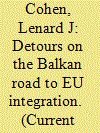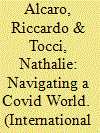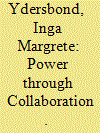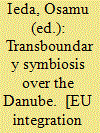| Srl | Item |
| 1 |
ID:
086034


|
|
|
|
|
| Publication |
2009.
|
| Summary/Abstract |
"Throughout the western Balkans, formidable challenges to economic reform and democratic consolidation threaten to reawaken old problems and reinforce negative tendencies."
|
|
|
|
|
|
|
|
|
|
|
|
|
|
|
|
| 2 |
ID:
148818


|
|
|
|
|
| Summary/Abstract |
It is widely argued that the pre-accession process of the Eastern enlargement affected political competition in Central and Eastern Europe. While such claims have been substantiated in general theoretical propositions, there is a lack of theoretically informed research attempting to explain how political competition was affected throughout the region. This article utilises Lijphart’s institutional typology to better understand how pre-accession processes shaped political competition under consensus democracies. The article shows that the consensually designed democracies of Poland and the Czech Republic were able to mitigate the negative impact of the pre-accession process through the rise of Eurosceptic parties.
|
|
|
|
|
|
|
|
|
|
|
|
|
|
|
|
| 3 |
ID:
094750


|
|
|
|
|
| Publication |
2010.
|
| Summary/Abstract |
In this article, the author examines Romanian child protection reforms during European Union (EU) accession as a case of externally facilitated modernization aimed at solving acute social problems. The data for this case study came primarily from fifty-three unstructured interviews with civil servants, civil society representatives, and EU officials. The author finds that in a similar manner to other externally driven modernization projects, the belief according to which Western institutions constituted a universal blueprint, applicable regardless of particular contexts and historical legacies, led to unintended consequences. What is more, because the reformers did not envisage that Western institutions might carry their own pathologies, they ended up replicating some of these pathologies. The study suggests that the goal of externally facilitated public policy should not be to create replicas of Western institutions but to spur local innovation that takes advantage of successful Western institutional logics.
|
|
|
|
|
|
|
|
|
|
|
|
|
|
|
|
| 4 |
ID:
180063


|
|
|
|
|
| Summary/Abstract |
The world on which Covid-19 has unleashed its destructive force is one where the partly supranational and multilateral-minded EU is ill at ease. The pandemic has devastated economies across the world and exacerbated pre-existing dynamics of growing geopolitical rivalry and the declining clout of multilateral regimes and practices. The EU’s response to the Covid shock has been twofold: on the one hand, it has embarked on a new integration effort, with the contours of a ‘transfer union’ emerging for the first time in EU history; on the other hand, it has failed to use the crisis to advance its strategic autonomy agenda. The reason for this dichotomy is that, while the severity of the Covid emergency has shifted public and elite attitudes towards economic solidarity, the lingering commitment to the US has worked as a brake on a similar trend in European foreign policy preferences.
|
|
|
|
|
|
|
|
|
|
|
|
|
|
|
|
| 5 |
ID:
160869


|
|
|
|
|
| Summary/Abstract |
Who gets what in high-level European Union (EU) negotiations and how? This study draws on data concerning stakeholder preferences during heated negotiations leading to the EU’s 2030 Climate and Energy Policy Framework. It tests the explanatory values of Liberal Intergovernmentalism (LI), the Advocacy Coalition Framework (ACF), and Historical Institutionalism (HI). Large member states were key (LI). However, coordinated groups of member states, bound by specific common interests, also played crucial roles. ACF explains the 2030 Framework only if: a) the decisive coalitions consisted of the EU’s supranational institutions, the coordinated groups of member states and long-term advocacy coalitions in the interest group community; b) coalition members held comparatively similar views; and c) coalition members adjusted their strategies mutually and/or shared information. The European Commission set the agenda (HI). The analysis demonstrates that LI, HI and ACF may be used as complementary analytical tools, filling several of each other’s gaps.
|
|
|
|
|
|
|
|
|
|
|
|
|
|
|
|
| 6 |
ID:
162498


|
|
|
|
|
| Summary/Abstract |
This article argues that the Western Balkans Counterterrorism Initiative (WBCTi), originally a Slovenian proposal of late 2014, represents an efficient form of regional security cooperation, particularly when regional EU integration is considered. The Initiative that was accepted by the Justice and Home Affairs Council of the EU in late 2015 is the first of its kind. It is aimed at both incorporating and integrating all forms of international assistance that concern increasing the capacity to prevent and combat terrorism, violent extremism, and radicalisation leading to terrorism. Additionally, it is directed at decreasing duplication of actions by international actors and raising levels of efficiency of security cooperation and reform. This article analyses the Initiative by focusing on its structure and claiming that its specific framework represents an innovative approach establishing a fully functional regional structure outlining EU-Western Balkans security cooperation.
|
|
|
|
|
|
|
|
|
|
|
|
|
|
|
|
| 7 |
ID:
135184


|
|
|
|
|
| Publication |
Sapporo, Uyana Tomohiko, 2014.
|
| Description |
133p.Pbk
|
| Series |
Slavic Eurasian studies; no.27
|
| Standard Number |
9784938637804
|
|
|
|
|
|
|
|
|
|
|
|
Copies: C:1/I:0,R:0,Q:0
Circulation
| Accession# | Call# | Current Location | Status | Policy | Location |
| 058014 | 320.12437309439/IED 058014 | Main | On Shelf | General | |
|
|
|
|